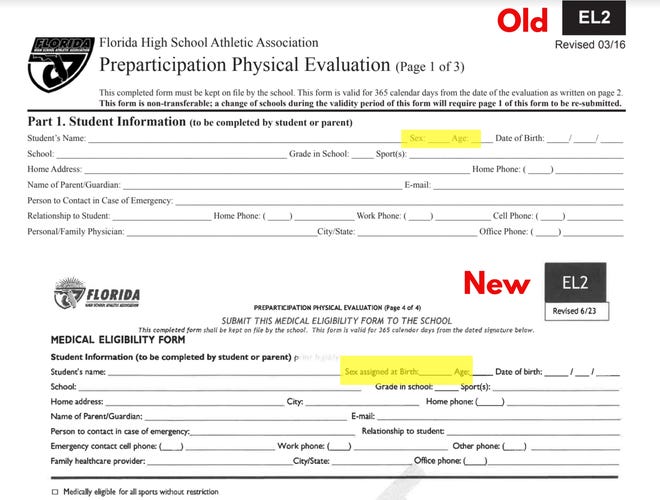
Timeline of emails: What really happened when FHSAA removed menstrual questions?
The Palm Beach Post | By Katherine Kokal | April 13, 2023
Emails obtained by The Palm Beach Post show mounting pressure on the FHSAA included a $35,000 sponsorship from Sprouts.
News that Florida asked its female high school athletes to answer questions about their menstrual periods on annual registration forms sparked national outrage and scrutiny over reproductive privacy following the overturning of Roe v. Wade.
After an investigation by The Palm Beach Post, hundreds of scathing public comments and national media coverage, the Florida High School Athletic Association removed the five questions about athletes’ periods from the forms on Feb. 9.
But what was going on behind the scenes in the leadup to that decision?
Internal emails obtained by The Post show mounting pressure on the FHSAA’s Executive Director Craig Damon in the week before the special meeting in which the FHSAA board removed the questions.
The scrutiny came from inquiries by Gov. Ron DeSantis’ office, and the emails show Damon took the menstrual questions off a draft of a form the same day he spoke with DeSantis’ deputy chief of staff, Alex Kelly.
Also in play was a threat by Sprouts Farmers Market chain to pull a $35,000 sponsorship and more than a dozen media requests for interviews with Damon about FHSAA’s plan to make the five questions about menstrual periods mandatory.
Here’s who knew what and when in the weeks leading up to the FHSAA’s abrupt scrapping of the five questions:
Tuesday, Jan. 17: FHSAA committee agrees to make menstrual questions mandatory
FHSAA’s sports medicine committee discusses the physical examination form. They had been directed by the board of directors at its November meeting to weigh in.
The committee of 13 men and five women recommends making the questions mandatory.
As the committee discusses the questions, Damon joins the meeting late and says he’s recently spoken with athletic directors from every state about the issue. He says that 49 of 50 states require athletes to answer the menstrual questions and to turn in the information to their schools.
That information was incorrect — a review by The Post found that 15 states either did not ask the questions about menstrual history or did not require athletes to disclose that information to their schools.
Also on this day, legislators in the Florida House file a bill that would allow the governor to appoint and the Senate to confirm eight of nine members of the FHSAA’s board of directors.
Board members and FHSAA staff members don’t appear to discuss the legislation in internal emails or during public meetings.
Friday, Jan. 20: Florida legislation on FHSAA board filed
Damon calls a special meeting for the FHSAA’s sports medicine to reconsider the menstrual questions on Jan. 24.
Also on this day, Florida state senators file a bill that would allow the governor to appoint and the Senate to confirm eight of nine members of the FHSAA’s board of directors. The bill now awaits a final vote in the House.
Tuesday, Jan. 24: Damon retracts information about states requiring menstrual history questions
At the special sports medicine committee meeting, Damon retracts his earlier information about the 49 of 50 states collecting menstrual information.
The committee agrees to stick with its plan to make the questions mandatory.
Thursday, Feb. 2: FHSAA attorney says menstrual questions were ‘somehow’ tied to abortions, privacy rights
12:44 p.m.: Damon emails FHSAA’s attorney and the FHSAA’s board chair asking whether they should conduct an emergency meeting to “settle this issue,” referring to the menstrual questions for athletes.
1:53 p.m.: Attorney Leonard Ireland responds: “I do not believe this came up until Rowe (sic) v. Wade was overruled by the Supreme Court and someone – group? Somehow tied it to abortions.”
Friday, Feb. 3: Sprouts threatens to pull $35K sponsorship
9:36 a.m.: Brandi Waters, one of four associate executive directors of the FHSAA, emails attorney Ireland and Damon. She says Sprouts Farmers Market is “drawing up paperwork” to pull its sponsorship because of the menstrual questions. She asks Ireland to review and let them know his thoughts from the “legal side” of things.
Attached to the email is a two-year contract outlining Sprouts’ $70,000 sponsorship of the FHSAA’s annual state championships in several sports.
It had already paid $35,000 for one of those two years.

9:48 a.m.: Emails show Sprouts doesn’t want to be mentioned in the news release or social posts related to the FHSAA’s upcoming “Spirit Showdown” starting Feb. 13.
Luke Miller, who represents Sprouts, tells the FHSAA that the company’s board is meeting the following week to discuss the partnership, and they promise an answer by Feb. 13.
10:16 a.m.: Associate Director Jamie Rohrer tells FHSAA’s communications team that the board will likely have an emergency board meeting via Zoom in the next week. The only agenda item will be the forms.
10:10 a.m.: Rohrer emails the FHSAA marketing employee who works with Sprouts that Damon, Gerdes and Ireland are trying to organize an emergency board meeting for Thursday.
She says, “If we can get that together, I’m hopeful this will help Sprouts make a decision that is favorable for the continuation of our partnership.”
11:41 a.m.: Rohrer responds to a draft meeting agenda sent by Damon to the associate directors saying the new form would be “more favorable to parents and groups we’re hearing from.” She asks if anyone had done a side-by-side comparison of the proposed national physical examination form and Florida’s current form.
11:48 a.m.: Damon emails the entire board of directors about the special meeting.
He says, “The (sports medicine committee’s) recommendation on the EL2 preparticipation physical examination form has generated quite a stir. With Winter Sports Championships coming up over the next few weeks, President Gerdes would like to call an emergency (board) meeting on this issue.”
12:32 p.m.: Rohrer responds to an email chain among the associate directors to tell them she’s comparing Florida’s existing physical examination form with a form used by other states and developed by national physicians groups.
She says the new form’s use of “sex assigned at birth” instead of “sex” stands out to her, as well as instructions to physicians to examine male athletes’ genitalia.
“These are things the media and others will likely key in on,” she says.

Saturday, Feb. 4: Damon takes questions off proposed form after review by the ‘powers’ that be
9:22 a.m.: Damon emails the four associate directors that he’s just done a 40-minute review of the form with the “powers to (sic) be.”
He says he’s eliminated the menstrual questions and that he “got a thumbs up from their team.”
5:45 p.m.: Damon emails Kelly, the deputy chief of staff for DeSantis, directing him to the attached draft proposals of the physical examination form.
6:36 p.m.: Kelly emails back, says he’ll review them and call with any questions or feedback. He says he’s “grateful for the outreach.”
Monday, Feb. 6: DeSantis official says, ‘We appreciate your keeping us in the loop’
9:19 a.m.: Damon emails Kelly asking him to give him a call
12:26 p.m.: Kelly emails to say “thank you so much for talking earlier. And we really appreciate your keeping us in the loop.”
Tuesday, Feb. 7: Damon officially announces special board meeting
6:57 a.m.: Damon emails the communications team telling them the emergency board meeting has been set for 10:30 a.m. on Thursday.
Thursday, Feb. 9: Board votes to remove menstrual questions. Congress announces bill putting in peril money for schools that require them.
10:30 a.m.: Board of directors meeting begins. The board votes to remove the menstrual questions.
That same day, members of Congress announced legislation that would prohibit schools that receive federal funding from collecting or requiring information regarding students’ menstrual cycles.
U.S. Reps. Adam Schiff, D-California, Ilhan Omar, D-Minnesota, and Sheila Cherfilus-McCormick, who represents parts of West Palm Beach and western Palm Beach County, introduced the legislation, named the PERIOD Act.





